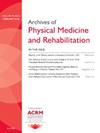通过远程医疗对下肢截肢退伍军人进行可持续性步行锻炼
IF 3.6
2区 医学
Q1 REHABILITATION
Archives of physical medicine and rehabilitation
Pub Date : 2025-05-01
DOI:10.1016/j.apmr.2025.03.020
引用次数: 0
摘要
退伍军人康复干预的持久性(DRIVE)资助机制支持新颖的、多模式的康复方法,包括临床指导的干预和退伍军人自我管理的组成部分,以提高康复结果的长期持久性。这项由DRIVE机制资助的试验侧重于下肢截肢后的持续步行运动。虽然传统的下肢截肢康复有效地改善了功能能力,但康复后的健康行走水平并不能持续。目的:通过“步行运动可持续性训练(WEST)”研究退伍军人下肢丧失后家庭自我维持干预的效果。WEST试验由一个由患者、物理治疗师、职业治疗师、医生、心理学家、护士和生物工程师组成的跨学科团队设计,是一种基于行为框架和以患者为中心的沟通的心理知情方法。在远程医疗环境中使用可穿戴传感器和同伴支持来提供干预措施,目的是维持步行锻炼。方法swest是一项随机对照优势试验,对一项为期18个月的远程医疗步行锻炼自我管理计划进行了测试。资深参与者将完成六次一对一干预课程和六次同伴支持小组课程。实验组将接受自我管理计划,重点是持续步行锻炼,对照组将接受注意力控制健康教育。每日步行步数(主要结局;活动记录仪)将在参与研究期间持续监测。次要结果评估WEST干预对传统VA截肢护理的潜在转化。影响:本试验中独特的康复模式通过远程医疗自我管理模式解决了下肢截肢后持续久坐生活方式的问题。新的跨学科策略将告知实施潜力,包括临床有效性的信号。本文章由计算机程序翻译,如有差异,请以英文原文为准。
Walking Exercise Sustainability through Telehealth for Veterans with Lower-Limb Amputation
Background
The VA Durability of Rehabilitation Interventions for Veterans (DRIVE) funding mechanism supports novel, multimodal rehabilitation approaches, including clinician-directed interventions and Veteran self-managed components, to improve long-term durability of rehabilitation outcomes. This trial funded by the DRIVE mechanism focuses on sustained walking exercise after lower-limb amputation. While conventional lower-limb amputation rehabilitation effectively improves functional capacity, healthy levels of walking are not sustained post-rehabilitation.
Objective
The "Walking Exercise Sustainability Training (WEST)" trial examines a Veteran home-based self-maintenance intervention after lower-limb loss. The WEST trial, designed by a transdisciplinary team of patients, physical therapists, occupational therapists, physicians, psychologists, nurses, and bioengineers, is a psychologically informed approach based on behavioral frameworks and patient-centered communication. Wearable sensors and peer support are used in a telehealth environment to deliver the intervention with the aim of sustaining walking exercise.
Methods
WEST is a randomized controlled superiority trial that tests an 18-month telehealth walking exercise self-management program. Veteran participants will complete six one-on-one intervention sessions, and six peer-support group sessions. The experimental arm will receive a self-management program focused on sustaining walking exercise and the control group will receive attention-control health education. Daily walking step count (primary outcome; actigraphy) will be continuously monitored during study participation. Secondary outcomes assess potential translation of the WEST intervention into conventional VA amputation care. IMPACT The unique rehabilitation paradigm in this trial addresses the problem of persistent sedentary lifestyles following lower-limb amputation through a telehealth self-management model. The novel transdisciplinary strategy will inform implementation potential, including a signal for clinical effectiveness.
求助全文
通过发布文献求助,成功后即可免费获取论文全文。
去求助
来源期刊
CiteScore
6.20
自引率
4.70%
发文量
495
审稿时长
38 days
期刊介绍:
The Archives of Physical Medicine and Rehabilitation publishes original, peer-reviewed research and clinical reports on important trends and developments in physical medicine and rehabilitation and related fields. This international journal brings researchers and clinicians authoritative information on the therapeutic utilization of physical, behavioral and pharmaceutical agents in providing comprehensive care for individuals with chronic illness and disabilities.
Archives began publication in 1920, publishes monthly, and is the official journal of the American Congress of Rehabilitation Medicine. Its papers are cited more often than any other rehabilitation journal.

 求助内容:
求助内容: 应助结果提醒方式:
应助结果提醒方式:


